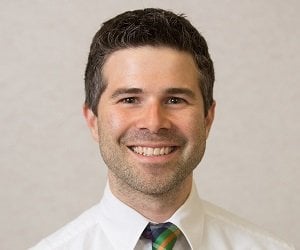I walked into my first rotation with a stethoscope and granola bar in my pocket and a LOT of nerves. I had no idea what to expect. I knew I had to impress my preceptor (which I imagined was easier said than done) and ace my shelf exam because this was the specialty I wanted to pursue. Talk about a lot of pressure. A fellow medical student and I walked into the hospital on the first day and while we were very obviously lost in the hallways, a tall man walks up to us and asks, “Are you looking for Dr. ___ ?” We slowly nodded our heads, still confused. He sticks out his hand and comments “well, you’ve found him.” So began our first day.
medical student
5 Tips for Finding and Working With a Mentor
Do you know anyone who raves about their mentor? A mentor can offer you expertise and motivation as you work toward your goal of entering medical school and becoming a doctor. A medical student, professor, physician, or anyone with experience and knowledge in the medical field who is able listen, relate, and help invest in your future can be a mentor. For example, finding a mentor who is a physician can provide you with the perspective of someone currently in the profession. Whereas a medical student can give you the first hand perspective of someone who has recently gone through the application process and is currently working toward their degree.
How to Have a Successful Premedical Freshman Year
The transition from high school to college is stressful for many students, and perhaps more so for those who already have their hearts set on attending medical school. For newly-minted premedical students, the first two semesters of college can represent the first steps toward their professional goals, and the prospect of doing less than their anticipated best is daunting. If you are one such new premedical student, you may be asking what steps you can take to maximize your success in your freshman year of college. How will you manage a new kind of social life? Which clubs and outreach activities should you consider? And most of all, how will you navigate your first academic course load as a premedical student? If you’re pondering any of these questions, read on for some tips about how to have a successful first year in college.
Q&A with Dr. Shane Quinonez, Pediatric Geneticist
Dr. Shane Quinonez is a Clinical Assistant Professor and the Associate Program Director of the Pediatric Residency Program at The University of Michigan. He earned his MD at The University of Michigan and then completed his pediatrics, medical genetics, and biochemical genetics training there as well.
When did you first decide to become a physician? Why?
I wish I could answer this question by showing a childhood picture of myself with a toy stethoscope around my neck. The truth is not nearly as cute. As an undergraduate student at The University of Toledo, I initially enrolled in pharmacy school, thinking I would become a pharmacist. Around my sophomore year I began reflecting on what truly gave me fulfillment in all of my previous jobs, educational experiences, and extracurricular activities. I quickly realized that I was most happy when I was interacting directly with people and was presented with opportunities to improve their lives. While these elements were clearly available in pharmacy, I felt that I would be best able to explore these interests as a physician. Though my decision was fairly calculated, I do not think I would be nearly as fulfilled and happy with my choice had I not made that decision based on the person I truly am rather than the person I wanted to be.
Division of Labor: How to Keep a Household Running While Your Spouse is In Training
By Amy Rakowczyk, SDN Staff Writer
One of the biggest challenges that arises during medical school is actually all of the non-medical school “stuff”: namely, household duties and chores. How much help can you expect from your spouse in this regard, and how will you divide up the duties?
An Apology to a Medical Student
Dear medical students: I’m sorry.
You had just finished two years of didactic learning and couldn’t wait to feel like a “real” doctor. You finally were starting your clerkships, that is, finally working with patients and getting deep in the trenches.
Switching Specialties: Why It’s Never Too Late to Try Something Different
“So if you don’t mind me asking, why did you make the switch?” I get … Read more
Understanding Our Patients’ Drugs: The Need for a Pharmacy Elective Within Medical School
Republished with permission from here. I spent one year working full-time as a pharmacy technician … Read more
20 Clinical Practice Guidelines That Medical Students Should Know
Updated February 17, 2022. The article was updated to correct minor grammatical errors and formatting. … Read more
7 Ways to Shrink Your Student Loans and Pay Them Off Faster
Updated September 2, 2021. The article was updated to correct minor grammatical errors and to … Read more
How To Make New Friends and Find A Community
If your spouse’s medical studies have recently brought you to a new city, or to a new community within a familiar city, you will need to search for new friends and support groups. Medical school is not about being “strong” and pushing through all the hard stuff. It’s about having people to lean on when the going gets tough.
Building yourself a new community and finding friends, especially those that you hope to be able to share your delightful, as well as dark moments with, is not an easy task. However, it is a necessary one!
Osmosis Co-Founders Ryan Haynes and Shiv Gaglani
Ryan Haynes, PhD and Shiv Gaglani, MBA discuss how they went from anatomy partners to the founders of Osmosis, an advanced learning platform that helps medical & other health professional students succeed in classes, on board exams, and in the clinic.
Tell us about yourself
Ryan: I’ve had a longstanding interest in how the brain works. Before attending Hopkins for med school I did a PhD in neuroscience at Cambridge studying decision making. I now live in Charlottesville, Virginia where my wife is a resident in neurology at UVA.
Shiv: I am passionate about developing scalable solutions in the fields of healthcare and education. I attended Johns Hopkins School of Medicine between 2011-2013 and then took a leave of absence to co-found Osmosis as well as complete an MBA at Harvard Business School. I’m now based back in Baltimore where my fiance, Malorie, is an OB/GYN resident at Johns Hopkins.
The Future of MD/DO Residencies Under Single Accreditation
Recently, the Accrediting Council for Graduate Medical Education (ACGME) announced that by 2020, all allopathic and osteopathic residency programs would come together under one umbrella accreditation system. This is a significant shift away from the historical separation between MD and DO programs. DocThoughts’ Host, Nirmal Gosalia, invited Dr. John Potts, Senior VP of Surgical Accreditation at the ACGME and key leader in the implementation of the Single GME System, to clarify the decision and its future impact on graduate medical education.
Immigrants, Insurance and Nonprofits: Our Generation’s Obligation
Republished with permission from here. The future of American health care remains uncertain. It was … Read more
Jump Starting Your Job Search While In Medical School: Part 2
Read about steps 1 and 2 in Part 1 of this series here.
Right now, your number one priority is, very understandably, focusing on your medical school workload. Still, it’s never too early to start thinking about your job search. There are easy steps you can take now that will prepare you for your job search and give you a competitive advantage when it’s time to start applying.
Chronicles of a Med Student: The View From the Other Side of Boards
Finally on the other side! This morning I soaked in the luxury of not having … Read more
How Do College and Medical School Classes Differ?
As a premedical student, you are likely familiar with some of the subjects that are covered in the standard medical school curriculum. After all, how different could biochemistry in medical school be from undergraduate biochemistry?
While your premedical courses will certainly provide you with a strong background with which to approach medical school, it is imperative that you understand that undergraduate classes differ substantially from medical school courses in both difficulty and breadth of content. Think of your undergraduate science education as preparation for medical school—not as an opportunity to cover all of the material in one of your medical school classes prior to matriculation. Here are four key ways in which medical school courses differ from undergraduate classes, as well as some tips on how to deal with these differences:
Dear Me, M3 | Love Me, MD
Dear Me, M3:
As graduation approaches and the days of fourth year freedom quickly fade away, the terrifying reality of being a stupefied intern becomes more and more paralyzing. Self-doubt started as a whisper but is slowly escalating to a deafening scream. I have read and re-read the letter you wrote in attempt to silence the negativity— to remember how I felt as a naive third year student trying to navigate the world of clinical medicine— to remind myself of a time when graduation was an unforeseeable future and matching into residency seemed like an absurd possibility. Undoubtedly, your foresight advice will sharpen my self-awareness and hold me accountable to be kind and compassionate, to stay humble. Yet, in order to reassure myself that I will make it, to bury the self-doubt, it is time for some self-to-self hindsight advice— time to remind myself of lessons learned along the way. So here it goes:
The Year of Privilege, Part 2
In my last article, I wrote about my perspective on the third year of medical school and how it has evolved over the course of this year. Medical education is unfortunately sparse with free time, which makes it difficult to reflect; writing these posts has been one way for me to slow down and process all the things I’ve seen, the knowledge I’ve gained, and the relationships I’ve built with patients. It was the process of doing this that led to last month’s article, highlighting some of the amazing things I’ve gotten to do this year and some general themes about the clinical side of medical school.


















